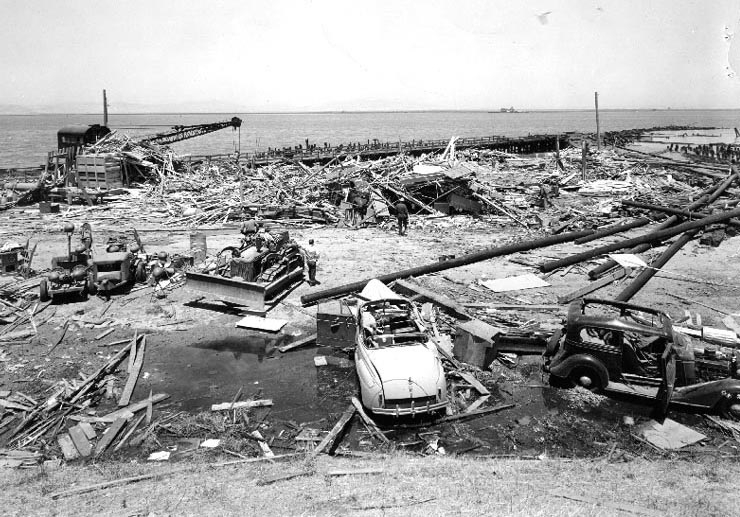|


THE PORT CHICAGO EXPLOSION AND MUTINY, July 1944.
Port Chicago was a loading port near San Francisco. In July 1944,
munitions being loaded onto the SS EA Bryan exploded, killing 320 and
injuring 390.
The loading was being done by Black servicemen – the ones who had failed the entry test and/or were judged unreliable. Their immediate officers were also Black, but were
disliked as ‘slave drivers’ by the men. The man in charge of the port, Captain Kinne, had no training or experience in the loading of munitions, and held competitions between the teams to see who could load the most the fastest, with punishments for men thought to be working slowly. When the local Union offered training, it was refused. The winches on the
EA Bryan were faulty.
A Navy inquiry into the cause of the explosion found nothing
wrong with procedures or management, and blamed the servicemen.
On the days after the explosion, the men left uninjured had
assisted in clearing up the debris but, when told to go back to loading work on
9 August, 258 refused to do so,.
They were told that refusal was mutinous, and carried the death penalty. Most then went to work, apart from 50, who were arrested and imprisoned. The Navy decided that Seaman 1st Class Joe Small – whom they had asked to oversee the men – was the ringleader; he was
put into solitary confinement. One of the accused was a cook with a nervous disorder; another
man had a broken wrist. All gave evidence that they were simply frightened to go back to work if their working conditions had not changed.
During the trial it came to light that their statements had been improperly
obtained, with accusations of duress.
Halfway through the men’s trial, NAACP counsel Thurgood
Marshall started attending the proeceedings. The NAACP considered the case an example of the Navy giving African Americans the dirtiest and most dangerous jobs.
Marshall gave a press conference saying that the men were guilty of
insubordination, not mutiny.
The court found all 50 men guilty of mutiny. Apart from the youngest two men, who were given 8 years, all the men received between 10 and 15 years imprisonment.
Marshall arranged an Appeal, but just two of the 50 had their sentences quashed.
The Pittsburgh Courier newspaper used the campaign to
highlight its ‘Double V’ campaign – for victory over fascism … and racism.
All but one of the men were released when the war ended, but
it was not until 2024 that the Navy exonerated them, citing multiple errors in
the trial.
|